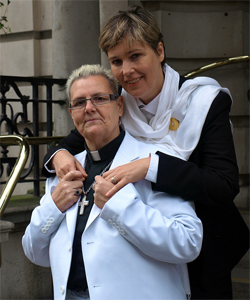The government is expected to announce full marriage equality for gays and lesbians under reforms to marriage laws to be announced later this week. The reported move will end the final major legal discrimination against gays and lesbians in Britain.

Rev Sharon Ferguson and Franka Strietzel are among the couples challenging the ban on gay marriage (Photo: Chris Houston)
According to the Sunday Times, a proposal to end the ban on same sex marriage will be announced by the Liberal Democrat equality minister Lynne Featherstone at the same time as the government announces the time table for civil partnerships to be held in religious buildings.
Civil partnerships were introduced in 2005 and offer gays and lesbian couples similar legal rights to straight married couples. Differences include the grounds for dissolution, some insurance and pension rights and they are not recognised as having the same status as marriage abroad. A consequence of the ban on gay marriage means that a married transgendered person must divorce their partner before being recognised in their new gender. In addition, couples are barred from having any religious elements in the civil partnership ceremony. An amendment the Equality Act by Labour peer Lord Waheed Alli was passed just prior to the election, but the new government delayed the implementation of the changes. Religious insitituions are not forced to host ceremonies if they do not wish to.
Prior to the general election, deputy prime minister and Liberal Democrat leader Nick Clegg wrote on PinkNews.co.uk: “I support gay marriage. Love is the same, straight or gay, so the civil institution should be the same, too. All couples should be able to make that commitment to one another.” In October, the party adopted full marriage equality including allowing straight couples to have civil partnerships as official party policy. The move was controversially not supported by the gay lobbying organisation Stonewall.
In April, the chancellor George Osborne told gay rights campaigner Peter Tatchell that the Conservative party would “consider” full gay marriage.
The proposals which will then be put out to consultation by the equality minister will give religious faith groups the option of conducting and officiating at gay marriages. The Quakers and Liberal Judaism have already stated that they wish to conduct same sex marriages.
Although the Archbishop of York, Dr John Sentamu, gave the reports a guarded welcome telling the BBC that he “believes in a liberal democracy, and actually wants equality with everybody,” the Church of England does not support the introduction of gay marriages or civil partnerships being held in churches. A spokesman said: “Given the Church’s view on the nature of marriage, the House of Bishops has consistently been clear that the Church of England should not provide services of blessing for those who register civil partnerships.”
The spokesman said the change will “lead to inconsistencies with civil marriage, have unexplored impacts, and lead to confusion, with a number of difficult and unintended consequences for churches and faiths”.
“Any change could therefore only be brought after proper and careful consideration of all the issues involved, to ensure that the intended freedom for all denominations over these matters is genuinely secured.”
The Catholic Church and those representing the Muslim faith are also opposed to gay marriage and holding religious civil partnerships.
The Equal Love Campaign, led by Mr Tatchell lodged a case at the European Court of Human Rights challenging the twin ban on gay marriage and straight couples having civil partnerships. Four gay couples applied to hold marriages and were rejected, as were four straight couples who applied to hold a civil partnership. It is understood that the Liberal Democrats were uneasy at the prospect of the coalition government fighting against gay marriage in such a public way given that introducing gay marriage is official party policy.
A Whitehall source told the Sunday Times: “This is not just about gay rights but about religious freedom. Quakers and liberal Judaism want to do this. Attitudes have changed to gay marriage. We are going to look at what legislative steps we could begin to make gay marriage possible.”
Last year, a poll for PinkNews.co.uk found that 98% of the LGBT population support full gay equality and that civil partnerships are not good enough. It is one of the few official standpoints ofPinkNews.co.uk that it believes in marriage equality.
It took a high profile campaign last autumn for the gay lobbying organisation Stonewall to say that it would campaign for gay marriage. The charity was criticised for by its founders Michael Cashman and Sir Ian McKellen on PinkNews.co.uk for not at that point campaigning for gay marriage. Despite the change in policy, the organisation does not support marriage equality because it will lead to the introduction of straight civil partnerships, something it believes could cost £5bn in lost tax revenue.
Should full gay marriage be introduced, the only other significant legal discrimination against gay men will be the ban on donating blood, although the government have signaled in the past that they will look to end this practice.
ENDS
meanwhile ......
Under current rules, ceremonies must be secular and cannot contain religious elements, such as hymn singing and Bible readings.
The Sunday Telegraph said equalities minister Lynne Featherstone was expected to outline shortly plans to lift the ban.
The weekly broadsheet warned that the new move could open a "legal minefield", with gay couples possibly taking action against faith groups if they were barred from tying the knot in their chosen place of worship.
The Office of National Statistics said that at May 2010 more than 26,000 civil partnerships had been formed in Britain.
No comments:
Post a Comment